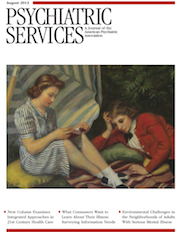The Family Guide to Mental Health Care
The author of this volume, Lloyd Sederer, is the medical director of the New York State Office of Mental Health and a previous mental health commissioner for New York City. Dr. Sederer is also a former medical director of Harvard’s McLean Hospital and has recently become the first medical editor for mental health for the Huffington Post.
As described by the actress Glenn Close in the book’s foreword, the author’s style is that of someone who is sitting at a kitchen table, gently explaining matters concerning mental illnesses. Consonant with Ms. Close’s characterization, while covering many aspects of mental health treatment and services, Dr. Sederer weaves throughout the book accounts of his personal experiences as well as anecdotal descriptions of many persons experiencing different types of mental conditions.
The book addresses a number of common mental illnesses, including depression and anxiety disorders, eating disorders, and various types of psychotic disorders. However, of the ten DSM personality disorders, only borderline and narcissistic personality disorders are addressed. The volume also does not include coverage of substance abuse and provides little information relevant to young children.
The author provides a useful overview of many psychiatric medications and describes a number of psychosocial therapies. I found his descriptions of exposure response prevention and dynamic deconstructive psychotherapy particularly helpful.
Being a person in recovery from schizophrenia myself, I was particularly pleased to see that throughout, the book attacks what it refers to as “the myth of schizophrenia as a poor-outcome disorder,” instilling a refreshingly optimistic view of the likely course and outcome of this condition. I was also impressed to find that the works of Dr. Carol North and Dr. Patricia Deegan are respectfully addressed, with Dr. Sederer stressing that although both have a diagnosis of schizophrenia and have been hospitalized for it, they nevertheless have gone on to become mental health professionals and are making substantial contributions to the field.
Dr. Sederer provides a somewhat unkind, but not unrealistic, description of various facets of our current mental health system. He portrays the overall system as a fragmented, intimidating maze. Regarding emergency departments, he opines that they are notorious for inadequate discharge plans and states that outpatient visits after discharge are rarely scheduled in a timely manner. In addition, he refers to the complex and problematic system of managed care as the scourge of health care clinicians.
Curiously, he paints a rather positive picture of Medicaid, indicating that it is often the best insurance coverage for people with serious (mental) illness, but then he goes on to point out that virtually no psychiatrist in private practice will accept Medicaid, even though many, he says, will accept Medicare. Also curiously, the author gives a quite positive portrayal of psychoanalytic treatment, saying that he personally benefited from having been “on the couch” four times a week for some six years. However, he later indicates that he knows of no insurance company today that pays for this type of therapy.
In summary, this volume is a practical, easy-to-read assortment of information and advice for many persons who have adult loved ones with a mental illness.



